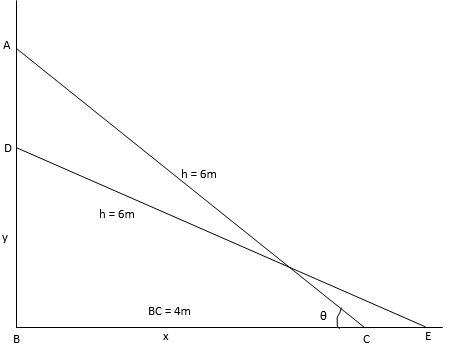The top of a ladder 6 metre long is resting against a vertical wall on a level pavement, when the ladder begins to slide outwards. At the moment when the foot of the ladder is 4 metres from the wall, it is sliding away from the wall at the rate of 0.5 m/sec. How fast is the top - sliding downwards at this instance?
Given: the top of a ladder 6 metre long is resting against a vertical wall on a level pavement, when the ladder begins to slide outwards, at the moment when the foot of the ladder is 4 metres from the wall, it is sliding away from the wall at the rate of 0.5 m/sec
To find how fast is the top - sliding downwards at this instance
Let AC be the position of the ladder initially, then AC = 6m.
DE be the position of the ladder after being pulled at the rate of 0.5m/sec, then DE = 6m as shown in the below figure.

So it is given that foot of the ladder is pulled along the ground away from the wall, at the rate of 0.5m/sec
![]() ……………(i)
……………(i)
Consider ΔABC, it is right angled triangle, so by applying the Pythagoras theorem, we get
AB2 + BC2 = AC2
⇒ y2 + x2 = h2……….(ii)
⇒ y2 + (4)2 = (6)2
⇒ y2 = 36 - 16 = 20
⇒ y = 4.47
And in same triangle,
![]()
Now differentiate equation(ii) with respect to time, we get
![]()
![]()
![]()
Now substituting the values of x, y, h and ![]() (from equation(i)), we get
(from equation(i)), we get
![]()
The value of h is always constant as the ladder is not increasing or decreasing in size, hence the above equation becomes,
![]()
![]()
![]()
And considering the same triangle,
![]()
Differentiating the above equation with respect to time we get

![]() [applying quotient rule
[applying quotient rule ![]() ]
]
Substituting the values of ![]() (from equation(iii)), x, y,
(from equation(iii)), x, y, ![]() (from equation(iv) and
(from equation(iv) and ![]() (from equation(i)) the above equation becomes,
(from equation(i)) the above equation becomes,

![]()
![]()
![]()
Hence the angle θ between the ladder and the ground is changing at the rate of - 0.11 rad/sec when the foot of the ladder is 4 m away from the wall.